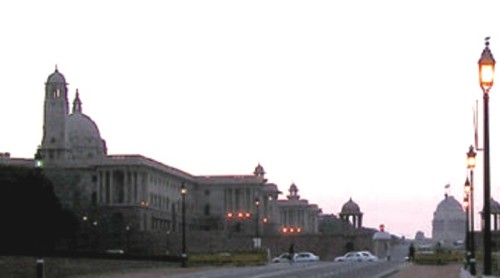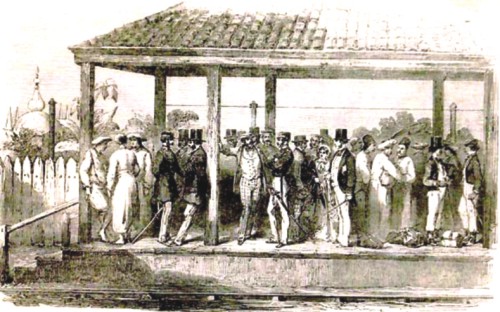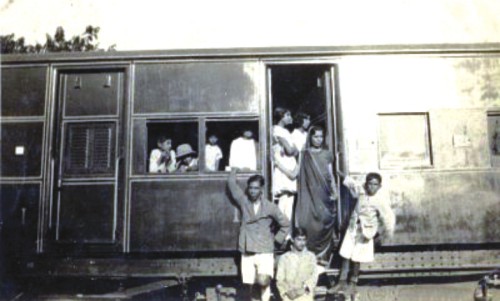| Flashback
Under the Same Sky
A Little English Girl meets her Waterloo!
Part V
Perveen Ahmad
What was life like in the late 1930's and 1940's? It was the time of World Water II, blackouts, sirens, food shortages and extra holidays from school because of all the above reasons. Indians were fighting a war they had to, as a colony of the British Empire. The sparks of Indian nationalism were visible, and political activists kept up their campaigns under Mahatma Gandhi for self-rule. The pillars of British administration under the Army, Navy, Air Force, Police, District Magistracy, Judicial Courts, Civil Administration and the all encompassing British Indian Railway kept India connected and under strict surveillance. There were rules and norms, which set the parameters of life for each of the services under the British system. This gave a sense of peaceful and controlled conditions in which some Indians could enjoy the benefits of the system.

Thus the Railway Colony in which my sister, my brother and I grew up was a world arranged with cohesiveness, of belonging to one of His Majesty King George's prestigious administrative arms. The network of rail lines that criss-crossed the subcontinent, with a rolling stock of thousands of wagons, coaches and engines gave India the position of being the largest railway in the world, after Russia. The Railway colonies in all the major cities of the subcontinent were proof of the gigantic Real Estate holdings that the British Indian Railways possessed and ruled over.
The Colonies with typical British logic were stratified, junior staff being accommodated in housing of the tenement or two storied flat designs, while officers had spacious and well laid out bungalows with 'servants quarters' at the back of the compound. The residential colonies were so planned that neighbourliness and socialising could be carried out within the boundary walls. Services of washer men, sweepers, gardeners, cooks etc. were ensured by providing barrack-like living quarters a little way off from the bungalows where railway employees could lie with their families. The surroundings, with neat metalled roads, stone slab pavements, hedges and shady trees, made for gracious living. Children had compounds to romp around in and could cycle or roller-skate along the roads outside. Social conduct was well defined and carried out with care, seniority was always maintained, but also allowing for families to know each other. The Railway official hierarchy was pure British with English, Scottish, Welsh and even Irish officers holding authority at senior most levels, but functioning at the mid and lower administrative levels through the Anglo-Indian personnel. This cadre had three characteristics, they were white skinned, Christian and educated in English medium missionary schools. An Indian had to be really meritorious, hard working and obedient to get a foothold at the Office Superintendent or Junior officer level. My father knew he had to rise from the ranks and get ahead of his Anglo-Indian colleagues. There were examinations and interviews for each step up the ladder, performance and annual appraisals under the dreaded ACR or Annual Confidential Report had to be overcome. The Boss had to be pleased. Father, with zeal and meticulous focus on carrying out administrative rules soon won the attention of his senior. He was promoted to Office Superintendent and at the time of Partition was Junior Personnel Officer or JPO, a rank of good reckoning, in those days.

A train station during the British Raj
If, for a while, I put aside the political currents that vibrated under our feet, and if I put aside the effects of the war that India was compelled to fight on the side of the Allies, and even if one does not get bitterly caustic about the cunning of the British in playing their last card in dividing Hindus and Muslims in the wake of Partition, I can still describe our living in those years as gracious.
All over the sub-continent Railway Colonies had similar characteristics. There was neighbourliness and a system of socialising, social conduct was clearly stated and meticulously followed.

Indians vis-a-vis British officers and Anglo Indians were not entirely separated within the colonies, but maintained a discreet distance. In the evenings and on holidays children played with each other, albeit the English kids, closely chaperoned by ayah's, mixed only with their parent's official levels. My elder sister recounted that there was a British girl who used to pinch and twist my sister's cheeks just for fun and to make her cry-both were merely seven years old. Then my mother took a stand. "The next time she pinches your cheeks just pinch her hard and don't leave till she cries out." Next evening the golden haired imp proceeded to pinch my sister's cheek, and my sister promptly grabbed her cheek and wouldn't let it go. The girl went red in the face, screamed for her mother who came running out of the house. This time my mother, who appeared from across the fence, stood her ground and told the lady what her daughter had been doing, repeatedly bullying my sister. Now she had been paid back as she deserved. After some stern words and glares there was no more of cheek tweaking followed consequently by a short spell of cold relations, and later the girls started playing together again. Sometimes even little Indians had to assert their place by force! The little English girl had met her Waterloo! Copyright (R) thedailystar.net 2008 |
